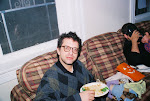I wrote about the book, and the effect on the action and focus of the book of Van Onselen's understanding that Silver was the Ripper; and then, I evaluated that evidence, and refrained from any unnecessary criticism beyond that. I did however compare his previous treatments of the same material. And I asked questions any social historian would ask, about the "vice trade" and the parameters of "whiteness" in turn of the century Johannesburg, and so on.
When I'd first submitted a draft, a somewhat inferior and less careful version of what the South African Historical Journal ended up publishing, I was presented with a commentary from an unknown reader who appeared to me to be gate-keeping in a really obvious way. I was pushed to clarify that I was not accusing Van Onselen of anti-semitism, which I duly did. (CvO is not an anti-semite.) I was pushed toward some unknown rhetorical point about "global" connections and other matters, voiced as if to suggest I entirely recast the argument and structure of my review-essay. I made a few more changes and clarifications, and then said (e-mailed) something like, "Look. It appears someone over there does not want to publish my essay but it is not going to change that much. Maybe he or she should write their own review."
So yesterday I got the journal issue in the mail (they sent two copies), with a thank you note from Cynthia Kros. In the journal, the review essay is there, followed by Jonathan Hyslop's first "book review," which is of the same book, CvO's Fox and the Flies. My essay is twelve pages long. Hyslop's is four. I wonder, did Hyslop see my review essay in advance, over there in the University of Witwatersrand, and indeed comment to me under the cloak of anonymity, asking for more than I could deliver, before drafting his review? And if so, would that be why Hyslop's essay reads as if it were a response to my essay?
Hyslop's argument is for the importance of the book insofar as it is a portrait of Joseph Silver and his milieu over an extended period of time. My essay addressed the evidence for thinking Silver a psychopath, for thinking him befuddled (tertiary syphilis), for thinking him The Ripper. Most of all my essay was about what happens to the framework and the interpretation when Silver's actions are made reflective of an unarticulated young manhood spent in the alleys of Whitechapel, London town, cutting and hacking at women in the coal fog.
Hyslop also suggests Silver may not be the Ripper by the evidence van Onselen presents and makes his own criticism (of the book's length and style) that (at least in the finished version of the essay) I did not.
The chair's secretary called me to ask for the link that would take one to the essay. I told her I did not think the University of Maryland subscribed to the South African Historical Journal electronically. It is a Taylor and Francis journal we pay to collect in print form. I then sat down in my office and did a search and found that I had "Open Access," a green light, to journals published by Taylor and Francis as a UMD user, according to what I could see on screen, and so I opened up the most recent issue, issue 61, 1 (2009), and I could indeed open Eric Worby's essay and others in the issue. Only my own essay was "not available" for Pdf. or any other viewing outside the abstract.
The chair's secretary then e-mailed me with a link that indeed did deposit my essay on the screen, followed by a banner proclaiming the UMD right of way. I couldn't figure out how she navigated there.
Today that link no longer brings the article, just the blocked abstract page. One has to get onto the site after signing in as a registering user, and then search the journal for Landau, and then toggle on that. Otherwise my essay is off limits. Again, this link works only if you are all signed in:
Even if we did subscribe to Taylor and Francis journals, the electronic reader can only see Hyslop's response, not my provocation. Fix that, hey, SAHJ? In all fairness, after letting Hyslop re-proclaim Van Onselen's importance, don't bury the point of view you found obnoxious but somehow fundamentally sound on factual and interpretive grounds.
Thanks, SAHJ!

2 comments:
Just for the record, I never laid eyes on Paul's article before it was published. Nor did anyone on the SAHJ editorial board discuss his article with me. My review simply represents my response to the book.
Jonathan Hyslop
Thanks Jonathan, and of course I entirely believe you. I still wonder if it is normal practice at SAHJ to commission a review essay and a book review from two different writers for one issue.
Post a Comment